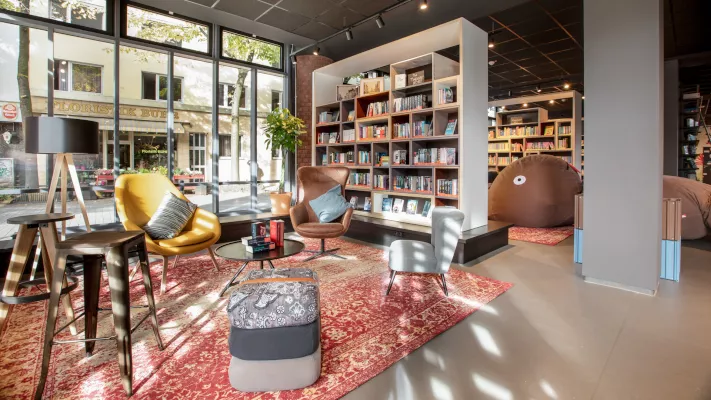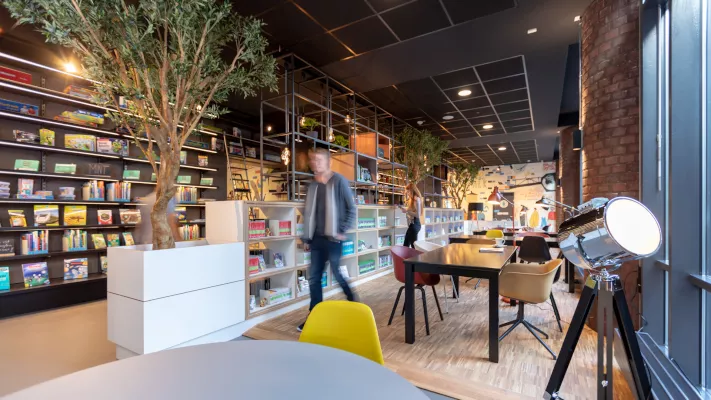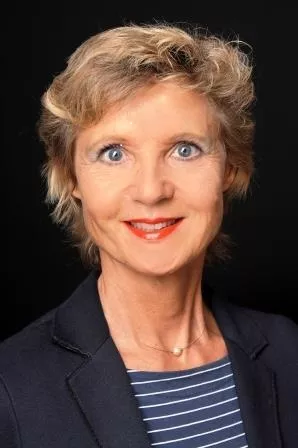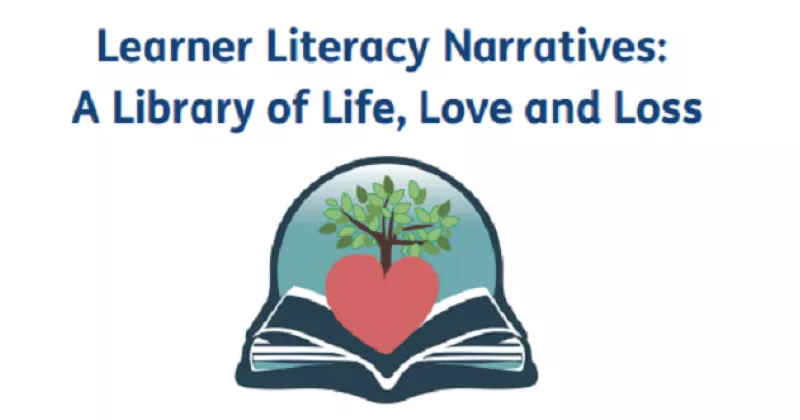Be a maker - not a taker! The Cologne Public Library explores new territory

Original language: German
Reading time approx. 5 minutes—read, like, comment!
Libraries in transition
Digitalisation is an irreversible process; talk of the fourth industrial revolution is everywhere. As a result, many areas of society are currently in flux, including libraries. All over the world, institutions, organisations, and many other sectors and industries have to reorient themselves. The classic purpose of libraries lies in the imparting of education and knowledge—and essentially nothing about that has changed. However, libraries must now find ways of accomplishing this mission under the new conditions. In doing so, they cannot simply adjust their previous offers, but rather they must develop a completely new vision for libraries. These days, equal access to knowledge is necessary far beyond the written word. Education in the 21st century is no longer possible without digital education; the use of new technology and social media is one of the prerequisites for social participation. The central question is: How can libraries harness digitalisation? When seeking to answer this query, it is important to consider people and their needs.

Prognoses indicate a severe shortage of MINT-skilled workers in the coming years. MINT—mathematics, information, natural sciences, technology—are vital cultural skills and will in the future be increasingly valued. Aside from the necessary and obvious task of providing reading and media guidance, libraries also have the ability to spark young people’s interest for this area by providing the right opportunities. This means that libraries can help children to see digital offers from more than just a consumer perspective. The Cologne Public Library made a bold statement by organising MINTköln, a MINT-festival with more than 100 events in just two weeks. Critical journalists such as Dirk von Gehlen say that Germany has been left behind by digitalisation. “Therefore, we need fearless use of future technology to be present not just in schools [...]. We need a second education system that also educates adults,” Gehlen writes in the Süddeutsche Zeitung and calls for a “new generational learning contract”. Libraries must take on the role of arbiter in this process.
Today, libraries are places where knowledge becomes tangible; they are interactive spaces which encourage activity while at the same time offering a change of pace. The definition of learning is deliberately broad and includes more than just learning from books—learning through activities and community participation play an important role as well. Libraries combine progress with participation. People want to be more than just passive recipients, they want to actively participate. They want to try new things, be creative, develop their own “products”, and share their knowledge and ideas with others. In the age of omnipresent digital communication and networking, spaces which promote active involvement as well as direct interpersonal communication are increasingly important. Libraries are becoming a so-called “third place”, complementing people’s homes and places of work. The sociologist Ray Oldenburg (1989) categorised our living spaces into first, second, and third places. The home is the first place, the workplace the second. Third places are spaces where people come together, places of cultural and social interaction. These may be public spaces within a city, or semi-public locations such as train stations, modern coffee shops like Starbucks, or libraries. The latter in particular occupy a prominent role. Digitalisation requires new strategies for analogue spaces, too.

The library as the neighbourhood’s third place
This type of “third place” was recently developed in the Cologne district of Kalk. The starting point was the question: How can we reach as many children and young people as possible with little or no educational background or no attachment to libraries? The city district of Kalk, a former industrial area, is currently reinventing itself as a modern neighbourhood with a new standard of living. The new library takes this into consideration and offers space for experimenting and trying new things. Kalk’s population is younger than average and has the highest percentage of residents with migration histories. Affordable housing means that Kalk also attracts young families, students, and immigrants. The public library developed a unique strategy to create an attractive and popular space: The Kalk library is a joint project between the Dutch architect and creative guide Aat Vos, a local interior architect, and the Cologne Public Library. Aat Vos’s first completed library in Germany, the project in Kalk was also the result of a collaboration between the library and the city’s population.
The concept development process in the Cologne Public Library is fundamentally participatory in nature: Citizens of Kalk took part in the development and were able to make their wishes and expectations heard in a survey. The results were incorporated into the “design thinking process”, which consisted of multiple workshops with library employees of different qualifications and work areas. Together, they created a profile of this new, unusual library. The design thinking quickly lead to results and made all of the participants happy.
The goal was to develop a library able to cater to all sorts of client needs and expectations. For example, there is a fixed as well as a mobile “maker space”—a cargo bike, cutting-edge virtual reality headsets and gaming equipment, as well as an interactive screen custom-made for Cologne by the international artist group Urban Screen. This electronic tagtool wall allows for unique forms of experimentation—here, young people can use tablets to design and save large-scale graphics, graffiti, and animations together and at the same time. Music, too, can play a role in exploring different aspects of animation. An entire storey is dedicated to the young people who welcomed and accepted the library from the very first day. In this library, digital technology and interior architecture create synergy.
|
Log-in to join the discussion! |

About the author:
Dr. phil. Hannelore Vogt is the director of the Cologne Public Library, which was named “Library of the Year” in 2015. Previously, she led the Würzburg Public Library, which also won the “Library of the Year” award. Cologne’s culture committee named Dr. Vogt “Culture Manager of the Year” in 2016. She has a master’s degree in culture management and completed her PhD in marketing. Furthermore, she was also head of the advisory board “I&B” at the Goethe Institute, a member of the “Metropolitan Libraries Standing Committee” of the IFLA, and a strategic advisor for the Bill & Melinda Gates Foundation. She is a co-editor of the journal Bibliothek. Forschung und Praxis. [Library. Research and Practice.].
Related articles:
Once upon a time: Adult education in the National Library of Estonia



